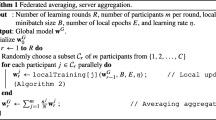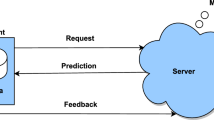Abstract
Service robots and other smart devices, such as smartphones, have access to large amounts of data suitable for learning models, which can greatly improve the customer experience. Federated learning is a popular framework that allows multiple distributed devices to train deep learning models remotely, collaboratively, and preserving data privacy. However, little research has been done regarding the scenario where data distribution is non-identical among the participants and it also changes over time in unforeseen ways, causing what is known as concept drift. This situation is, however, very common in real life, and poses new challenges to both federated and continual learning. In this work, we propose an extension of the most widely known federated algorithm, FedAvg, adapting it for continual learning under concept drift. We empirically demonstrate the weaknesses of regular FedAvg and prove that our extended method outperforms the original one in this type of scenario.
Access this chapter
Tax calculation will be finalised at checkout
Purchases are for personal use only
Similar content being viewed by others
References
Lu, J., Liu, A., Dong, F., Gu, F., Gama, J., Zhang, G.: Learning under conceptdrift: a review. IEEE Trans. Knowl. Data Eng. 31, 2346–2363 (2018)
Lesort, T., Lomonaco, V., Stoian, A., Maltoni, D., Filliat, D., Díaz-Rodríguez, N.: Continual learning for robotics: definition, framework, learning strategies, opportunities and challenges. Inf. Fusion 58, 52–68 (2020)
Parisi, G.I., Kemker, R., Part, J.L., Kanan, C., Wermter, S.: Continuallifelong learning with neural networks: a review. Neural Networks (2019)
McMahan, H.B., Moore, E., Ramage, D., Aguera-Arcas, B.: Federated learning of deep networks using model averaging. arXiv preprint arXiv:1602.05629v1 (2016)
Li, Q., Wen, Z., He, B.: Federated learning systems: vision, hype and reality for data privacy and protection. arXiv preprint arXiv:1907.09693 (2019)
Casado, F.E., Lema, D., Iglesias, R., Regueiro, C.V., Barro, S.: Learning from the individuals and the crowd in robotics and mobile devices. In: Iberian Robotics Conference, pp. 632–643. Springer (2019)
Casado, F.E., Lema, D., Iglesias, R., Regueiro, C.V., Barro, S.: Collaborative and continual learning for classification tasks in a society of devices. arXiv preprint arXiv:2006.07129 (2020)
Zhao, Y., Li, M., Lai, L., Suda, N., Civin, D., Chandra, V.: Federated learning with non-iid data. arXiv preprint arXiv:1806.00582 (2018)
Caldas, S., Wu, P., Li, T., Konečnỳ, J., McMahan, H.B., Smith, V., Talwalkar, A.: Leaf: A benchmark for federated settings. arXiv preprint arXiv:1812.01097 (2018)
Yoon, J., Jeong, W., Lee, G., Yang, E., Hwang, S.J.: Federated continual learning with adaptive parameter communication. arXiv preprint arXiv:2003.03196 (2020)
Haque, A., Khan, L., Baron, M.: Sand: semi-supervised adaptive novel class detection and classification over data stream. In: Thirtieth AAAI Conference on Artificial Intelligence, pp. 1652–1658 (2016)
Baron, M.: Convergence rates of change-point estimators and tail probabilities of the first-passage-time process. Can. J. Stat. 27(1), 183–197 (1999)
van de Ven, G.M., Tolias, A.S.: Three scenarios for continual learning. arXiv preprint arXiv:1904.07734 (2019)
Shoaib, M., Bosch, S., Incel, O.D., Scholten, H., Havinga, P.J.: Fusion of smartphone motion sensors for physical activity recognition. Sensors 14(6), 10146–10176 (2014)
Acknowledgments
This research has received financial support from AEI/FEDER (EU) grant number TIN2017-90135-R, as well as the Consellería de Cultura, Educación e Ordenación Universitaria of Galicia (accreditation 2016–2019, ED431G/01 and ED431G/08, and reference competitive group ED431C2018/29), and the European Regional Development Fund (ERDF). It has also been supported by the Ministerio de Universidades of Spain in the FPU 2017 program (FPU17/04154).
Author information
Authors and Affiliations
Corresponding author
Editor information
Editors and Affiliations
Rights and permissions
Copyright information
© 2021 The Editor(s) (if applicable) and The Author(s), under exclusive license to Springer Nature Switzerland AG
About this paper
Cite this paper
Casado, F.E., Lema, D., Iglesias, R., Regueiro, C.V., Barro, S. (2021). Concept Drift Detection and Adaptation for Robotics and Mobile Devices in Federated and Continual Settings. In: Bergasa, L.M., Ocaña, M., Barea, R., López-Guillén, E., Revenga, P. (eds) Advances in Physical Agents II. WAF 2020. Advances in Intelligent Systems and Computing, vol 1285. Springer, Cham. https://doi.org/10.1007/978-3-030-62579-5_6
Download citation
DOI: https://doi.org/10.1007/978-3-030-62579-5_6
Published:
Publisher Name: Springer, Cham
Print ISBN: 978-3-030-62578-8
Online ISBN: 978-3-030-62579-5
eBook Packages: Intelligent Technologies and RoboticsIntelligent Technologies and Robotics (R0)




